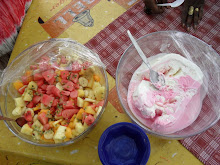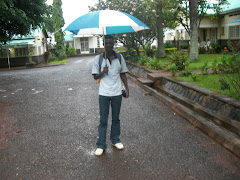I have been keen enough to be in touch with my world, to reflect on the ‘privileges’ am given and also came to the knowledge of what my worth is. I have also come to realize that may be some of us do not have any worth after all; ask the paranoid inhabitants of Baghdad and Kandahar! Or let me be relevant enough, the people from my small village in Buwongo in the middle of the great Bunyala swamp that is now being sold by the government.
I have heard various people claim that HIV is the most dangerous disease in our world today. Others, particularly those who have been in Africa, argue that malaria, killing atleast half a million a year, should be considered the most life threatening disease, while others still hold that cancer, diabetes and hypertension combined are the worlds most dreadful ailments today. I guess such people have a point, a serious one! However, all these assumptions miss the most vital point, that is to say, it is not malaria, nor diabetes that tops this list, rather, the prime suspect here should be the failure to attain the means to curb such diseases. Therefore, allow me to make my own claim, which I am ready to defend, that poverty is arguably the most haunting ailment of our time!
Subject to statistics, 70% of the world’s population lives below a dollar. If the world population stands at 6.84 billion today, then it means that nearly 5 billion people share this bitter fate. Having said that, let us assume that every person lives on 0.5 dollars a day, then, their annual financial budget should be something in the region of 182.5 dollars. With such a figure, it is inevitably impossible to dream of a balanced diet, for such a thing automatically becomes non-existent, whether in present, past or future! With such a budget, medication and schooling becomes a pure luxury; it is like talking of peace and love at the middle of Mogadishu. With such a situation, sanitation and clean water is deleted from the equation resulting into an inequality that may be mathematically unviable if tried out. With such a scenario, people forget of the necessity of basic needs and end up in an identity dilemma, where most certainly, most of them fail to classify themselves as Homo sapiens or just the proceeding groups. Clearly, the number one pandemic in our world today is poverty, a deadly pandemic!
Allow me to justify my point that indeed poverty is the greatest pandemic! I have no clear knowledge why this happens, but statistically speaking, poor people tend to have bigger families than their rich counterparts, this is possibly because for them, sex becomes a consolation, a way of relieving the unnecessary stress! On average, a financially incapacitated family has seven members that is, exclusive of the extendended family members; grandparents, uncles and aunts, just to note a few that normally become part of the family by default. Let us then stick to the number seven. Assuming that the total annual domestic financial base for a household is divided equally among the seven members, each member will have an average maximum of 26.07$ a year. Let us also assume that daily, each member spends and average of 0.1 $ on food (believe me, this happens quite often), multiplied by the number of days in a year, this will add up to 36.525 $ a year. Already such an individual would have lived by a deficit of over 10$ a year, equivalent to 40.1% beyond their total income. Let us also assume that such an individual spends an average of 0.0133’$ on water, this will translate to 4.87$ a year, added to the deficit that already exists, they will easily get something in the region of 15.325$ in deficit, amounting to 58.78% beyond the budget. If the average amount of money required annually for schooling, medication and clothing is lets say 260$ (given that such needs have never been basic for this people anyway, because of their price), then one person will have an excess of 270$ deficit on their budget translating to approximately 1025.263% deficit. Such a mathematical shock spells doom for a poor man.
I am sure most, probably all of you, reading this article have never lived in slums or met people living on isolated islands or experienced the tough life of the upcountry, yet truly, we have many of such people and am sure that whoever sits down to make such global statistics (on poverty around), by far underestimates what many people face, for indeed there are such people all over in our habitats. Given such conditions, how do you expect someone to comfortably feed their family? Is it even possible to have enough money to buy malaria tablets that cost about 1.25$? Is it even possible for one to buy a daily dose of diabetes drugs or go for a medical check-up once a year or even afford a chemo for a cancerous misfortune? Such people opt to die peacefully and slowly, with all their sufferings of course, and it is people like me and others that blame the whole thing on some innocent anopheles mosquitoes! I am happy that the government is offering free ARV drugs to HIV patients; this is a really noble gesture. However, such strong drugs need a balanced diet, a thing the masses cannot afford. I sometimes ask myself of the nobility of such a gesture!
I remember when I was a little young, something to do with ten years, that should be around 1910, I was left home with my little sister. Next door, there were my cousins whose parents had three days back gone to search for their daily bread and were not yet back. These six young kids, who were obviously younger than myself, were starving, literally starving. For me and my sister, we had four eggs reserved for lunch which we hoped would be sufficient for us. But checking on our dear cousins (in Africa this are our brothers and sisters), we could not help but make enough for all of us; indeed we had to make sure that it was enough! So what did we do? Well, we prepared a big mountain of Ugali (posho) and with the eggs, we literally added half a liter of water and made what I can rightly call an egg-stew. It was necessary and my cousins’ hunger was averted. I could see a smile at those malnourished faces, the boys and girls started playing and singing. Unfortunately, two of them died young, the remaining four never finished formal education and are now still hustling, just like their parents who (RIP) are now gone!
It is because of such situations that many have come up with all sorts of organizations and ideas. I have heard of the ‘poverty elevation fund!’ Is this something positive or what? I am not just so sure what this means, for in truth, we should be talking about eradicating poverty and not elevating it. Some few years ago, the Kenyan government came up with what is now called the ‘universal education.’ Such a system has been long in use in the neighbouring country Uganda. The achievement of such a thought and initiative was the massive inflow of poor kids into schools and at one moment, I thought that ignorance will be a thing of the past. This was a noble idea because many parents whose financial base played in the above described tune felt relieved. It was a noble idea indeed! However, when many thought that the program was in top gear, reality started cropping in. classes were filled to the brim, there was scarcity of teachers, insufficient books, classes and so many other necessary education tools! The implications of such realities were quite evident.
First, it is estimated that a normal class should have an average of 16 pupils and given that with such a program the classes were as big as having 100 kids. This implies that the teachers had over 500% heavier work load. With the meager salary the teachers are paid and so lack of motivation, we can only expect a product of more ignorant brood than anticipated. We cannot also expect children to study on empty stomachs, for this is completely unrealistic. I personally develop headaches when am hungry, resulting into a lack of concentration. To say the list, I can smell a rat in such a program because the ‘proponents’ of such ideas do not take their children to such schools but rather opt to pay dearly for their children’s academics. This system, designed for the poor has left many people more poor and ignorant than they were, for there is no greater evil than opting for half apparent measures and there is no dangerous mind than a mind half informed! The implication in such a system is the creation of classes where the rich, who are also the ruling class, will continue using their wealth, to rule the masses, for their children, who will be more educated and so ‘informed’ will be in a good position to make decisions for the less educated. It is an elite ruling society; it is a situation of ‘no place for a poor man society; it is the fruit of the modern man.
Therefore, as I was saying, poverty is a disease. It is no wonder we have a cursed system in India. With this pragmatic world directed by the capitalist policies of among others, consumerism, it will definitely require divine intervention to pull the worlds’ poor out of their shackles. It will definitely require a change of heart among the rich few to be inclusive. The danger is that anyone who may come up with such an idea is likely to be rebuffed and condemned to be a socialist as they have already labeled Barrack Obama. Whoever will want to fight for the poor will share the fate of Jesus Christ whose noble efforts led him to Calvary. Yet, a time is coming when all will indeed realize how temporal our hard earned riches are, and how fast such riches can sublime into thin air, never to return! Until then, poverty remains a pandemic!
Wednesday, April 14, 2010
Subscribe to:
Post Comments (Atom)


No comments:
Post a Comment
this is lovely